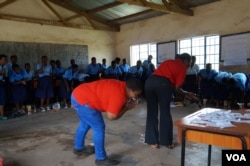Two international charities have launched a program in southern Malawi to help girls in rural areas remain healthy and stay in school. The charities are running girls’ clubs in the Mulanje district, a hotspot of HIV, the virus that causes AIDS.
Some 360 girls are taking part in the Mawa Girls clubs, which were launched in October in nine secondary schools across Mulanje district.
Statistics show that many girls here drop out from school because of early pregnancies and child marriages.
Two charities, Sentebale and the Global AIDS Interfaith Alliance, or GAIA, launched the clubs.
“Last year, we had close to 26 secondary school students who dropped out and 80 percent of them were girls. Some of them got married and some of them got pregnant," explains Lucy Munthali, program coordinator for GAIA.
Child marriage
Malawi has one of the highest rates of child marriage in the world. Half of all girls marry before age 18.
The country also has an HIV prevalence rate of nearly 10 percent, and females suffer 70 percent of all new HIV infections in Malawi, according to a report by UNAIDS.
Munthali says poverty forces many women and girls into transactional and unprotected sex.
“Considering that girls of ages between 15 and 24 are at higher risk of getting HIV, we help girls with psycho-social support to make sure they remain in school and they remain healthy," she says.
Life goals
Under the program, mentors encourage girls to think about their goals in life.
Loveness Sitima, a student at Namalowe Day Community Secondary School, says she benefits from the program.
She says she wants to be a nurse because she loves the type of the uniform nurses wear. But particularly she would like to be a nurse working in the maternity ward so that she can be helping women.
Another student from the same school, Elube Dinesi, says she has realized that when a girl is educated, she respects the rights of other girls, and motivates others.
Officials say the work of the clubs supports government programs focusing on girls' education.
Government needs help
Charity Nkhoma, with the special needs section of the Ministry of Education, says that although government is [doing] everything possible to promote girls' education, it cannot do everything alone, let alone reach each and every girl child. She says such interventions tremendously help in promoting education for girls.
Sentebale and GAIA officials say a similar program is bearing fruit in Lesotho and Botswana. They say if funding allows, they will launch the girls’ clubs across Malawi.





